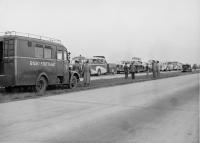| 32 |
RETURN TO GERMANY
On 9 October 1948, at 7.30 am, Buchman and a team of 260 rolled out of Zürich for Munich in a cavalcade of cars and buses. As they entered Ulm some hours later the bells of the cathedral welcomed them for their first official reception. They reached Munich that night, and gave the first showing of The Good Road in the Theater am Gärtnerplatz two days later. Here, as elsewhere on the tour, they had to give several performances a day to accommodate even some portion of those wishing to attend. For many Germans it was, as one said, 'the reopening of our windows to the world'. Even when the words of the play were not under- stood - it was played in English, and the supply of headphones for simultaneous translation was limited - the symbolic effect was significant. Bergrat Knepper, a mine manager who spoke no English, called the play 'the great experience of my life' because 'it meant we were accepted again by the international community'.

Buchman was happy. In 1937 he had said, 'This is not the time in Germany, but that time will come.' Now, while saddened by the devastation on every hand, he felt that he was for the first time entering Germany with an adequately trained team, with appropriate tools in the plays, and with the freedom to work. He was happiest of all at reunions with old friends. En route from Munich to Stuttgart the whole party took a detour to Freudenstadt, the place where the idea of moral and spiritual re-armament had borne in on him in May 1938. The little town had suffered severely from the shelling, and the Waldlust Hotel, in which he had often stayed, had only just ceased being used as a hospital and looked drab. But the proprietors, the Luz family, were back and the old mother, her son and daughters and Rosa, the cook, had worked much of the night baking with their last supplies. There were songs and memories and promises for the future. Rosa went on a ride with Buchman down the valley. 'I've made coffee for thousands of people in this hotel, for kings, princes and a lot of famous people. Not one of them thanked me. But today', she said, 'I am able to sit in the best seat and drive in this car with this gentleman. 'Before leaving Buchman replenished the Luzes' store of coffee and flour, as he did when he visited Princess Margaret of Hesse a few days later in the three poorly-heated rooms which the occupation forces had allowed her. He had been sending her food parcels for months, and there was, his colleague John Cotton Wood recalls, 'a tenderness about his visits as though visiting an old aunt'.
357
Photo: Radio Stuttgart intercepts and interviews the MRA mobile force on the autobahn from Munich.
©Arthur Strong/MRA Productions